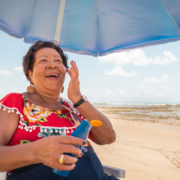Skin Cancer: The Cancer You Can See
Summer in the United States is safely going back to normalcy with the increasing number of COVID-19 vaccinations across the country. Americans are now more comfortable spending some time outside their homes. While enjoying the summer with family and friends, remember to keep yourself, family and friends protected from the harmful effects of the UV rays with “SPF”.
Skin cancer
Skin Cancer is the most common cancer in the United States, with millions of new cases diagnosed each year. Skin cancer usually begins in the sun-exposed areas of the body, such as the face, ears, neck, lips, and back of the hands. Although very common, skin cancer is one of the most preventable cancer and highly treatable when detected early.
Protection from the UV rays:
According to the Centers for Disease Control (CDC), ultraviolet (UV) exposure is the most preventable risk factor for skin cancer. UV rays come from the sun, tanning beds, and sun lamps can damage the skin cells. Protection from the UV rays is vital all year round, not just in the summer. Here are some ways to protect yourself from the harmful effects of UV rays:
- Stay in the shade between 10 am to 4 pm daylight saving time (9 am to 3 pm standard time)
- Wear protective clothing that covers the arms and legs
- Wear a wide brim hat that shades the face, ears, and neck
- Wear sunglasses that wrap around and block both UVA and UVB rays
- Use a broad-spectrum sunscreen with a sun protection factor (SPF) of 15 or higher
Finding skin cancer:
Skin cancer is cancer that you can see. And not all skin cancers look the same. A change in your skin is the most common sign of skin cancer, which could be:
- a new, expanding, or changing growth, spot, or bump on the skin
- a sore that bleeds or doesn’t heal after several weeks
- a rough or scaly red patch, which might crust or bleed
- a wart-like growth
- a mole (or other spots on the skin) that’s new or changing in size, shape, or color
- a mole with irregular shape or areas of different colors
A regular self-examination, done at least once a month, is recommended to monitor any skin changes. If you noticed any abnormal skin changes, schedule an appointment with a dermatologist. BioReference|GenPath offers skin cancer diagnostic tests and hereditary cancer screening for melanoma- one of the most common skin cancer types.
If you are a healthcare provider, click here to become a client so you can begin ordering tests from BioReference and GenPath today.
Sources: Skin Cancer Foundation https://www.skincancer.org/early-detection/ American Cancer Society https://www.cancer.org/ Centers for Disease Control and Preventionhttps://www.cdc.gov/cancer/skin/









